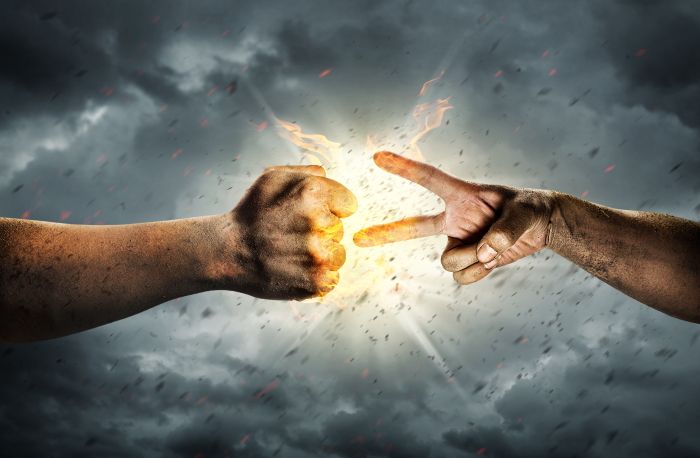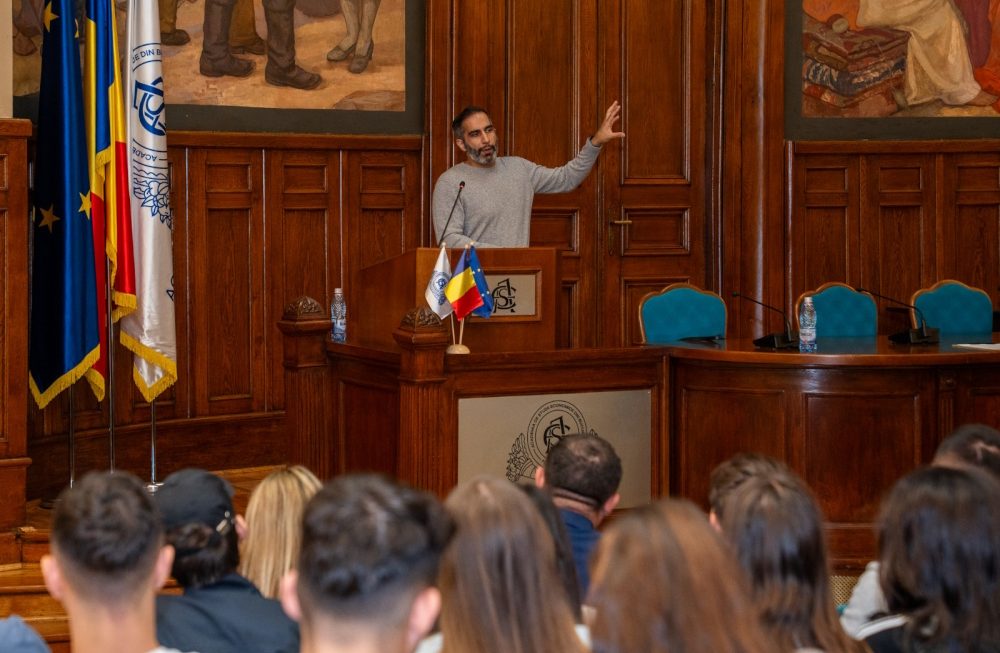
When troops move, finances shake
Foto: chaiyapruek / depositphotos.com
Earlier this year, the economic daily Wall Street Journal (WSJ) reported that, although the globalization was supposed to prevent the war, Russia could now come to prove just the opposite. According to WSJ authors, the Russian leader Vladimir Putin allegedly bet that the Western allies would not be willing to pay the economic price to prevent Russia’s move on Ukraine in an increasingly interconnected world. One of the pillars of the economic globalization is the principle that the economic ties would support keeping the peace. The economic interdependence around the globe makes us all more economically connected than ever before, everyone would suffer from a large-scale conflict, so the globalization should make the wars harder to start.
A CNN analysis shows that, if we judge at least simply the impact of a hot conflict on food supply, the Russian invasion leads to a disruption of the Ukrainian agricultural harvest, and this has a global impact, as the country is one of the four largest exporters of cereals, while Russia is the largest producer of wheat in the world. The rich barley, maize, sunflower and rapeseed harvests could also be affected. The prices on international markets for cereals and other foodstuff are also blown up by the explosions on the Ukrainian front.
But the more complex, twisted discussion full of geo-strategic connotations and interests is related to the potentially more substantial impact on Europe’s energy supply and to the consequences of Western sanctions on Russia after the invasion of Ukraine. Russia provides about 30% of Europe’s oil and 35% of its natural gas, with Russian supplies playing a vital role in the energy market and heating of homes in Central and Eastern Europe. The turning-off of Russian gas pipeline in response to sanctions penalizing the invasion of Ukraine leads to a significant under-supply of energy in Europe, exacerbating the problems related to the global supply and to the already high prices in the energy market.
The Western sanctions will have an indirect impact also on those who impose them. We already know that, at the time of writing this text, the West has imposed a wide-ranging package of sanctions on major Russian banks and companies, oil and gas sector, and technology imports. The effects on Europe and the rest of the world are also being felt, and analysts warn that the risks of war and even the costs of “an unpleasant peace” are “underestimated”. The economic crisis caused by the COVID-19 pandemic and its persistence has already pushed up oil and gas prices, as well as the prices of the main metals used in the production of everything from machinery and electronics to construction and kitchen tools. According to data quoted by ABC, the Russian share of global nickel exports was estimated at about 49%, palladium 42%, aluminum 26%, platinum 13%, steel 7% and copper 4%. In addition, the industrial supply chains are not and will not be immune at all to the armed conflict and to the sanctions applied to Russia.
The hot Russia-Ukraine war sparks a new massive rise in oil and gas prices, especially in Europe, but also with a global impact, and the inflationary impact will be even more severe if all countries stop buying Russian energy as a conflict-avoidance sanction. But, according to an ABC report, it is unlikely that all countries will comply: China is more likely to support Russia through large acquisitions, and even the EU is unlikely to give up Russian energy on the whole. But if it does, it could mean even higher prices in the countries that apply sanctions, and slightly lower prices for those who are still willing or forced to buy Russian oil and gas.
As for the financial markets, we may witness significantly soaring bond prices and falling interest rates. According to a bank analysis, this could be a convincing counterbalance to the current trend of rising interest rates in many advanced economies, and the financial markets would be even more complicated due to even higher inflation resulting from potential shortages of goods as presented above. In an analysis of the evolution of non-banking financial markets at the beginning of year, the Financial Supervisory Authority (ASF) noted that the global macroeconomic risks are on the rise, which led to a slightly volatile economic climate, while inflation had a growing trend beyond expectations.
As a result of the political tensions between Russia and Ukraine, the status of international stock markets worsened in February, while in Bucharest the volatility of BVB indices decreased, remaining at a medium to low level. Against the background of Omicron strain spread, concerns about tightening of the Federal Reserve monetary policy and growing geo-political instability in Eastern Europe, the status of international stock markets has deteriorated. Thus, long-term macroeconomic risks exceeded a critical threshold of 50%, which led to an increase in long-term bond yields. But the financial contagion is a viral threat to the wealth of nations and to the stability of capital markets, when a crisis on the stock market of one country causes a crisis on the stock exchange of another country. An analysis of the contagion indicates that the Romanian capital market is sensitive to the risk factors that influence the neighboring capital markets (Poland, Austria, Hungary), and the declines on the main European stock exchanges are a clear reaction to the worsening conflict in Ukraine, which has led to a pressure for sales in the international markets.
That is exactly why, since the very outbreak of the war in Ukraine, the Financial Supervisory Authority has warned the investors operating in the financial markets, including those operating in Forex, to initiate transactions only with authorized brokerage firms and be extremely aware of the risks related to foreign exchange transactions. During this extremely volatile period, ASF does not recommend unwary investors to trade in complex, highly sophisticated products, as they risk losing their money. “The investments in financial markets, including Forex, often involve significant fluctuations in stock prices and exchange rates, which may be influenced by the global or regional political and social context, by the monetary policy in various countries, and also by the inflation rate. Therefore, in this context, any investment must be carefully considered, and the risks must be well managed”, emphasized Nicu Marcu, Chairman of the Financial Supervisory Authority.
The war in Ukraine holds back the world’s economic recovery and at the same time undermines the status quo of Western capitalism and world order established at the end of the Cold War. The world economy is primarily affected by the shock on the oil and gas market. The global bread market is also hit hard, with the belligerents Russia and Ukraine being among the world’s leading cereal producers. But more than that, every rocket fired and every cannon shot fired not only hit targets on the Ukrainian fronts, they also blow up the global confidence.
And this happens exactly when the world is trying to “lick its wounds” after the pandemic crisis that left the global economy with two key vulnerabilities: high inflation and anxious financial markets. Analysts at Bloomberg Economics (and not only they) think that the aftermath of the Russian invasion in Ukraine will easily aggravate inflation and uncertainty in the financial markets: the collapse of markets will shatter confidence and economic well-being and drive money away from the investment projects currently under analysis. The households spend an increasing share of income on fuel and energy, with less and less money left for food (which also becomes more and more expensive) and other goods and services.
According to the most pessimistic scenario imagined by the Bloomberg analysts, a prolonged conflict and a hard-hitting Western response would lead to a disruption in the gas supply for Europe, triggering a severe global recession. In fact, the economist Nouriel Roubini announces that “a global stagflationary recession is now highly likely”, precisely because the war in Ukraine ”will trigger a massive negative supply shock in a global economy that is still reeling from COVID-19 and a year-long build-up of inflationary pressures”. The MSCI All Country World Index, a global indicator of stocks, has fallen to its lowest level in the past 12 months.
And beyond the economic threats, there is a redistribution of money: the budgets for defense could increase in Europe, US and other countries to reflect the increasingly dangerous global situation. “This will not reduce GDP growth, but it will reduce people’s well-being, because the resources put aside for defense are resources that cannot be used for consumption or investment in education, health or infrastructure,” emphasizes Jason Furman, former chairman of the Council of Economic Advisers of President Barack Obama. And when the money goes rather to the army, less to health, education and infrastructure, only the generals are the ones who rub their hands in joy, in front of crowded civilians increasingly burdened by poverty.
And the economist Nouriel Roubini gives a key geopolitical note: Ukraine’s invasion ordered by Vladimir Putin is a major escalation of the Second Cold War: “Four revisionist powers – China, Russia, Iran and North Korea – challenge US long-standing global domination and the West-led international order”. The war in Ukraine has thrown the entire world into a “geopolitical depression” with massive political, economic and financial consequences far beyond Ukraine’s borders. A new world (dis)order is about to begin. In the absence of the war in Ukraine, the biggest risk to the outlook provided by the S&P Global Economic Outlook report for this year and the next two to three years was China’s economic path. The combination of Chinese “Common Prosperity” target for 2025 and ongoing repression of the real estate sector aims to transform the model towards a more sustainable domestic growth, which would be financially more sustainable and more equitable.
But although the exact goals of the Beijing policy are not very clear, it becomes clearer that the second largest economic power of the world has “more tolerance for a slower GDP, less tolerance for speculations and more emphasis on supporting the middle class”. On February 1st, the “Year of Water Tiger” began, which according to the Chinese zodiac will be a year of huge changes. The Chinese say that the Year of Water Tiger will be a prosperous year thanks to the good traits of the tiger: strength and courage that lead to removal of bad things. At the same time, 2022 is indicated as a year of great changes, governed by “innovative visions and characterized by emergence of bold ideas”. Until now, the first quarter of the year is far from this constructive vision.
Strategically and politically, according to Joschka Fischer, Germany’s former foreign minister and vice-chancellor from 1998 to 2005, a military conflict between Russia and Ukraine has “deep consequences for Europe”, calling into question Europe’s order and principles – no more violence, self-determination, border inviolability and territorial integrity – on which it has been based since the end of the Cold War. Fischer believes that Europe would once again be divided into two parts: a “Russian Europe” in the East, and Europe of the European Union and NATO in the West and Center of the continent.
What is certain is that a seemingly local Russian-Ukrainian conflict exacerbates the crises related to the cost of living in much more European countries, and probably even on a global scale. The economic consequences of an extreme gesture will thus have dimensions that will be calculated at world level. In a global economy, when local troops move, global finances shake.
Daniel Apostol
Share
Share















